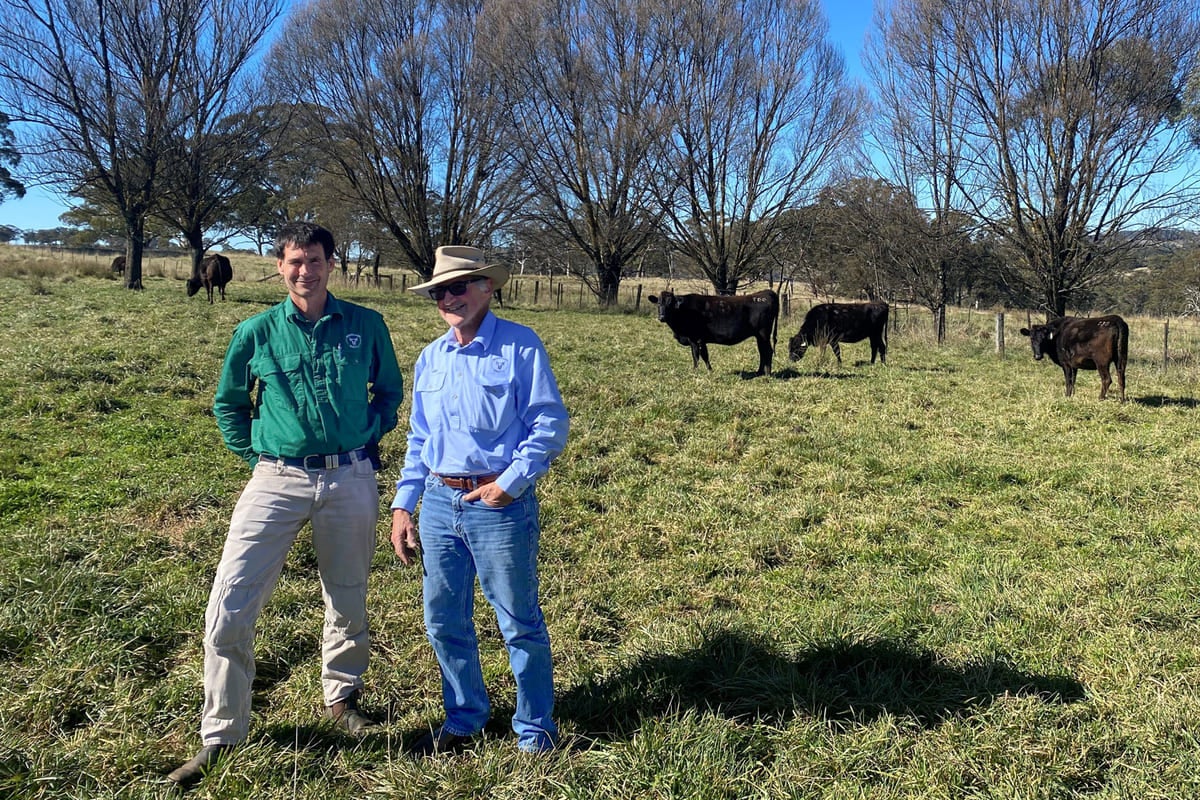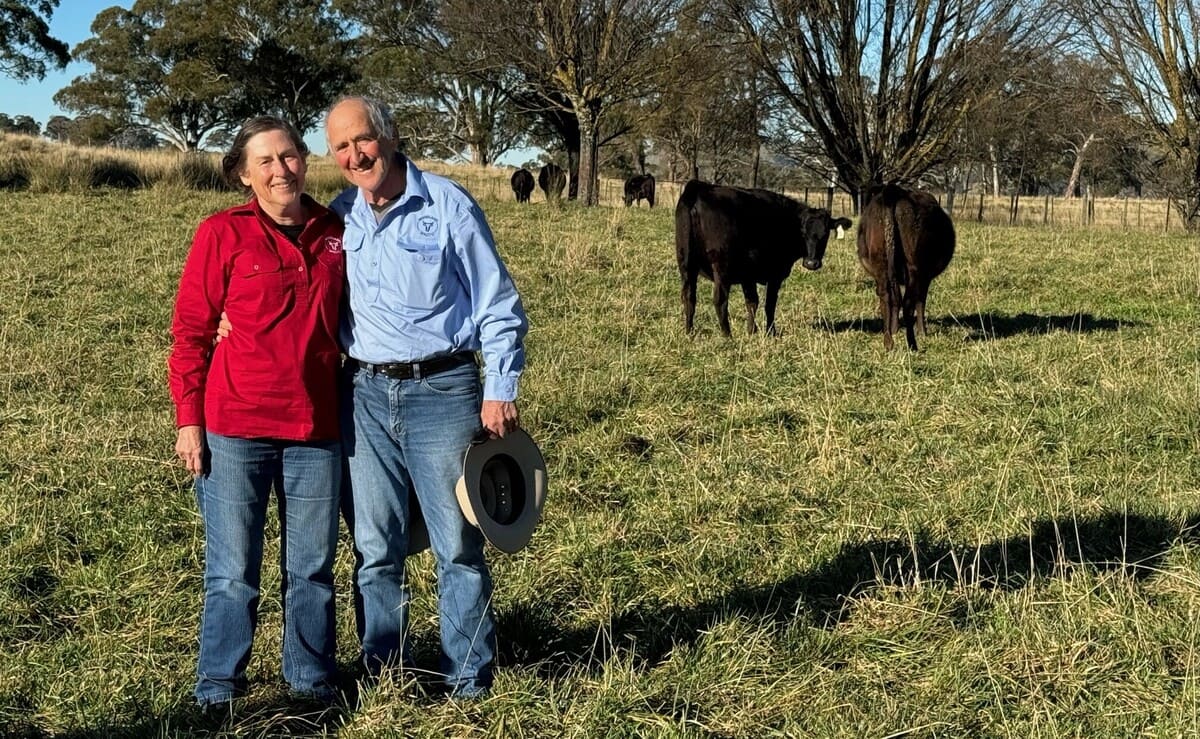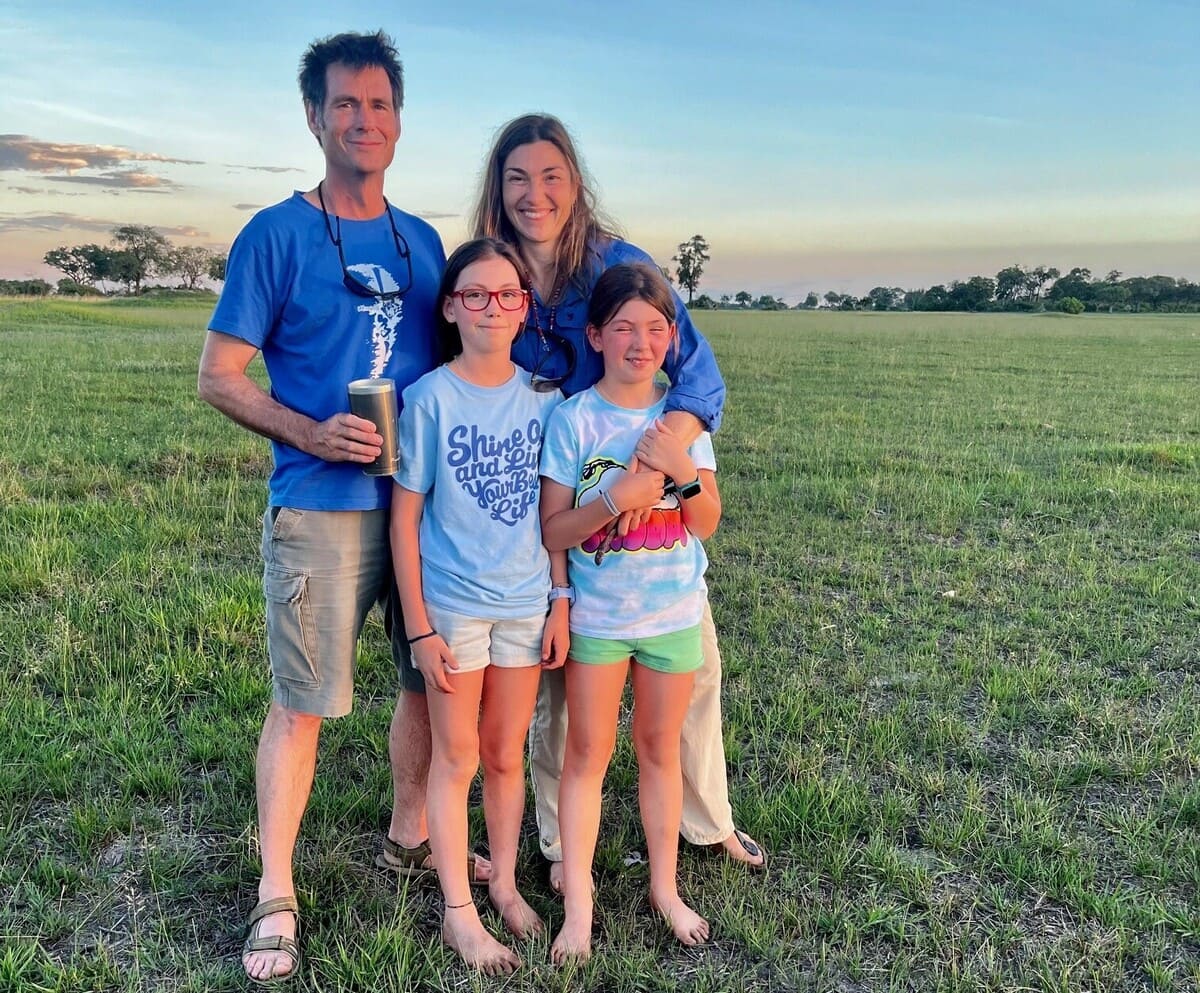Posted by on
12/07/2024
Michael Bavea and his father, John, have transformed the family’s Ben Lomond beef operation.
A decade-long career working as a mining geologist in the heart of Africa was a world away from the cattle property on which Michael Bavea now lives, yet as he’s discovered, the expertise required is far more similar than he ever could have appreciated.
A love of the outdoors, science, and global opportunity drew Michael to mining and geology, and for ten years he worked across the world, primarily in Africa and Liberia, maintaining a home in Barcelona and enjoying the spoils of European travel on his rostered days off.
It was a very different lifestyle from his rural upbringing as the son of a stock and station agent, and although Michael had invested in a property next to his parents, he had no aspirations ever to live, nor work on the farm.
However, the birth of his first child marked cause for a surprising re-evaluation.
“It was a fantastic career and a lot of fun when I was young, but the long fly-in, fly-out rosters didn’t align well with family life.”
Australia’s rural lifestyle became increasingly appealing, yet with his wife a Barcelona local, Michael laughs that it took a good ten years for her to take the plunge down under.
In 2016 the family made the unlikely move from Barcelona to Ben Lomond on the New England Tablelands, and for the first two years Michael worked with his parents, John and Jan, on their traditional Angus backgrounding and breeding operation.
It was during those first two years that Michael began questioned the farm business, and his role in it.
“It was a low input operation that Dad had managed comfortably, but it offered me no challenge, nor personal satisfaction,” he explains. “Lifestyle wise it was a terrific decision for my family, but the business wasn’t exciting me at all.”
A business transition to support personal, and business growth
The ongoing drought that devastated much of Australia in 2018/19 forced further re-evaluation.
“We have a small 364 hectare block, but it’s high value and highly productive, featuring an altitude of 1500 metres, 1000mm annual rainfall, and improved temperate pastures on basaltic soil, and I wanted to make it work better for us by reducing our numbers and increasing the value of the cattle we ran.”
Australia’s emerging Wagyu industry had long piqued Michael’s interest, presenting a higher-end product with global appeal, and a diversification away from the highly competitive Angus stud industry across the New England.
Destocking during the drought, whilst challenging, offered an opportunity to pave the way forward.
“During the depths of the drought we were essentially selling three Angus and buying a stud Wagyu cow,” he recalls. “As the drought worsened and more cattle became available we picked up more stud females, and that was essentially the makings of our herd.”
Michael credits fellow New England Wagyu producer, Lock Rogers of Wattletop Angus and Door Key Wagyu for guiding him through the transition, and what began as a commercial relationship has developed into a great friendship and a valuable mentor.
“There are 100 different ways we could have got it wrong, there are so many different sub-strains of Wagyu in Japan, and if your product doesn’t marble then it’s potentially worthless, and we’ve had good advice on the correct genetics thanks to Lock.”
His father John was also on board with the change of direction – and with five children he acknowledged that the business as it was lacked the margins to allow for succession.

John and Jan Bavea
“The challenge on a low margin operation is how it can be retained with five siblings, Mum and Dad’s only option would have been to sell, and he could see it made a lot of business sense to improve the business.”
Embracing the modern agricultural toolkit
Utilising his background in science, Michael introduced data and detail into their new operation, Woodland Wagyu, making a conscious decision to pursue only the top end of the breed.
This, he believes helps the enterprise weather the ups and downs of the market, and enables the enterprise to run fewer animals, but at an elite level.
One of the first tools implemented was DNA Profiling.
“Every single animal is DNA profiled which helps us understand the strengths and weaknesses of each animal. This helps with breeding decisions, and we can maintain what we want to keep, and correct what needs improvement.”
Data collection plays another key role in the continuous improvement of their herd, with birth weights, weaning weights, and growth rates all stored and analysed, and ultrasounds scanning every animal, recording attributes such as eye muscle scores and internal marbling.
Their foundation herd was 50 percent focused on F1 Market Wagyu – a Wagyu crossbred which relies on the bull having extreme levels of marbling, with the carcase weight derived from the Angus.
The other 50 percent of their herd is aimed at producing bulls for high-content full-blood Wagyu breeders, which delivers marbling from both the cow and the bull, but requires genetics to boost carcass weight.
In just four short years the family has seen an incredible uplift in its herd.
From 2018 to 2021 the muscle score of the foundation herd improved by 50 percent, and carcase weight over the same period was up 30 percent, and Self Replacing Index (SRI) improved by 25 percent.
This, Michael explains, has been achieved through improved genetics, and a highly considered selection of replacement females.
“We AI all our cows and use embryo transfer and IVF, and source our genetics from stud leaders from across the country – using our Woodland Wagyu bulls as a backup.”
MateSel is another innovation adopted on-farm, a breeding program Michael compares to ”Tinder for cows”.
“It’s a computer software program that looks at the individual attributes and Estimated Breeding Values (EBVS) of each bull and cow to drive selection and mating decision,” Michael explains. “It’s valuable as you can change the parameters to manage genetic diversity if you want to pressure certain characteristics up or down.”
Pedigree was another consideration that couldn’t be underestimated in the quest for herd improvement.
“Our approach is holistic - we’ve been able to implement innovative breeding techniques, DNA and thanks once again to Lock, we have an excellent pedigree.”
“We use Breedplan and EBVS to improve our herd, but it’s the sum of all parts – if you’re just chasing the numbers without combining those EVBS with a good pedigree and phenotype it doesn’t work, you need a trusted breeder that underpins those results.”
Breeding the ultimate animal
The challenge, Michael explains, is breeding a high-content Wagyu with marbling ability that also exhibits growth characteristics to suit a full-blood producer.
Despite one of their bulls recently ranked one of the highest marbling bulls in the world in Breedplan, Michael admits he’s “not quite there yet” in regard to meeting all his desired objectives.
“We strive for continual improvement, we have 300 full-blood breeders, but there’s always a bottom end in that which requires improvement or removal, and the top end needs to keep improving.”
“We produce 100 bulls a year, and some bulls are still for the F1 market and some for the full blood market, and ideally we want to breed an all-round bull with both extreme marbling and carcase weight characteristics that suits both markets.”
Michael has retained a clear vision for the operation and a lofty ambition that has remained unwavering over the past four years.
“Our objective is for Woodland Wagyu to be consistently ranked in the top 10 percent of the breed, or better, in Breedplan, which we’re now achieving.”
“This puts us at the pointy end of the industry, and at the very top we’re somewhat protected from market volatility – we’ll always be able to find a buyer.”
A passion for genetics will continue to shift Woodland Wagyu’s needle, and Michael admits that one of his greatest joys of the operation – albeit an unexpected one – has been putting his scientific expertise back into practice.
“I could never have imagined the scientific complexity involved in running a modern beef operation, and it’s been so rewarding, and ticks all the boxes for me personally and professionally, and I’m still discovering ways to use my science knowledge in the enterprise, which is really exciting.”
“From a lifestyle point of view our family is so happy, my daughters, Ellie, 12, and Charlie, 10 have enjoyed a beautiful outdoors childhood and my wife Carlotta has happily immersed herself in the New England community – the alternative was raising our girls in an apartment in downtown Barcelona, which I just can’t even imagine now.”

The Bavea family – a world away from bustling Barcelona.
The move has proved equally positive for the extended Bavea family, with the operation now in a viable position to support succession.
“As it’s turned out Dad has loved the transition, and it’s been a great partnership.”
“Dad was president of our local Landcare for many years and has a long background in improving animal husbandry outcomes and pasture and soil improvement through rotational grazing and optimal stocking density that I rely heavily on, and now we’re at the pointy end of stud breeding, I have the genetics and pedigree knowledge that taps into my background.”
Michael also credits his Rabobank manager, Max Davis from the Armidale branch, for supporting their vision.
“Max and the whole branch have been with us through this entire journey, and Max even came with me to the last Wagyu conference where I was asked to present.”
“It makes a difference that Rabobank shares our vision and enthusiasm, and for that I am always grateful.”
“I sat on the fence for two years not knowing whether to go down this stud Wagyu path or not, and not confident that I had a place in agriculture. Now I couldn’t imagine a more exciting, and generous industry to be involved in with so much potential for further growth, lifestyle, and purpose.”
